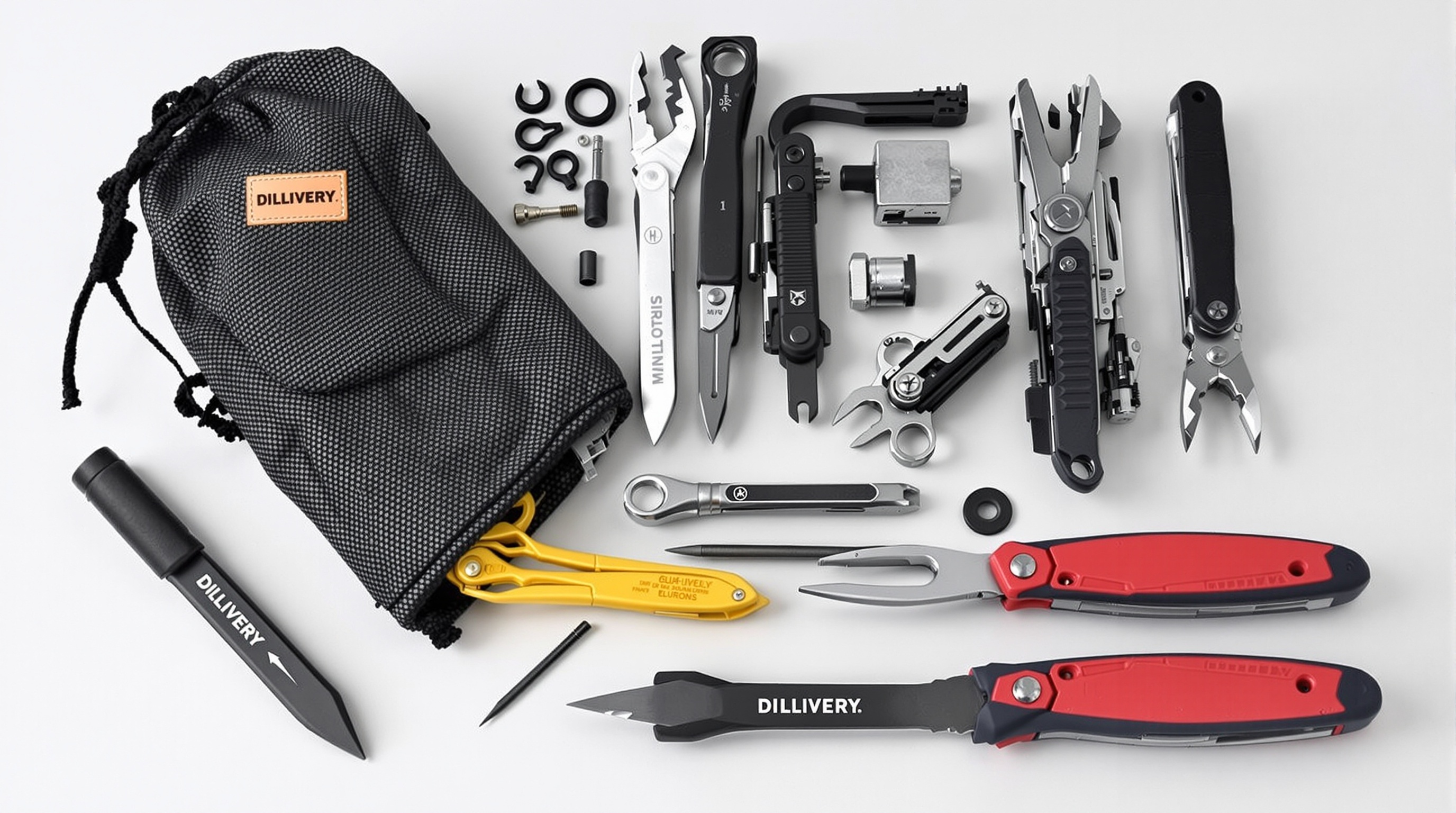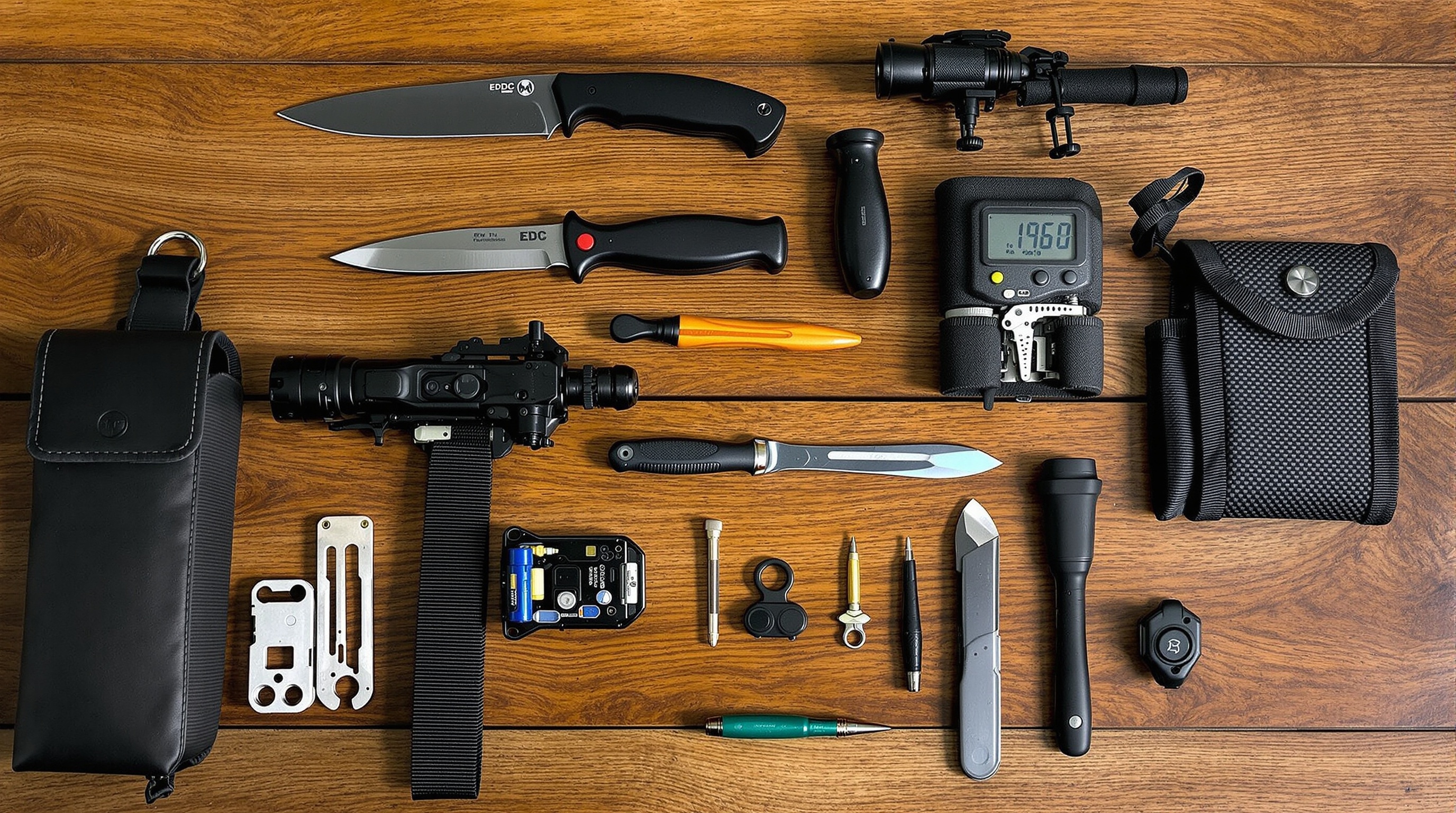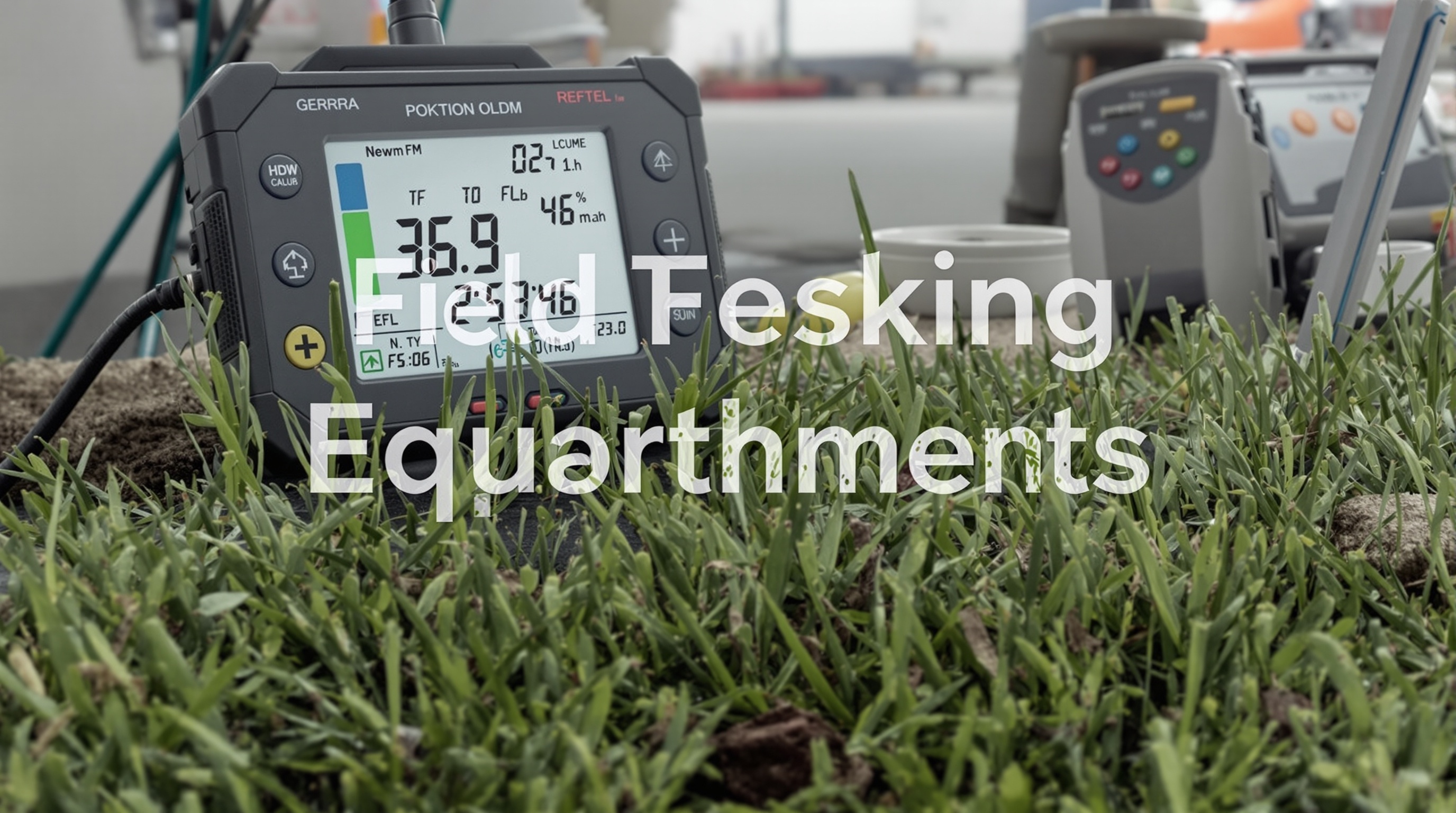Top Everyday Carry Tools for Versatility & Readiness
Discover the essential EDC tools that boost your daily preparedness and efficiency. Learn how to choose versatile gear for work, travel, and emergencies.

Everyday carry (EDC) tools are compact, practical devices designed to help you handle daily tasks, unexpected fixes, and emergency situations—anytime, anywhere. Whether you're a DIY enthusiast, urban commuter, outdoor adventurer, or professional, having the right tools on hand can dramatically improve your readiness and efficiency. This guide breaks down must-have EDC tools, from powerful multi-tools and pocket knives to compact screwdrivers and hex wrenches, and helps you choose the best options based on usability, portability, and function.
Understanding Multi-Tool Options
Multi-tools are a cornerstone of any thoughtfully curated tool collection, especially within the everyday carry (EDC) and DIY communities. They combine multiple functionalities into a single, compact device, offering convenience and versatility for a wide range of tasks, from quick fixes to more demanding repairs. Understanding the various types of multi-tools and their specific use cases is essential for selecting the right one for your needs.
Types of Multi-Tools
Multi-tools come in various forms, each designed to suit different environments and user preferences. The most common types include:
Full-Size Multi-Tools: Often featuring pliers as the central component, these tools include a wide array of implements such as knives, screwdrivers, wire cutters, saws, and bottle openers. Brands like Leatherman and Gerber are industry leaders in this category, providing rugged and reliable options for both professionals and hobbyists.
Mini Multi-Tools: Designed for maximum portability, these tools often include essential functions like small blades, flathead and Phillips screwdrivers, and scissors. While they sacrifice some capability for size, they remain highly functional for everyday situations.
Keychain Multi-Tools: Ultra-compact and lightweight, these are perfect for minimalists or as a backup tool. They typically include a few core features such as a small blade, pry bar, or hex wrenches.
Specialized Multi-Tools: Tailored for specific tasks, such as biking, fishing, or firearm maintenance. These tools focus on features unique to their intended use case, making them indispensable for enthusiasts.
Key Features to Consider
When evaluating a multi-tool, key features will influence both functionality and usability:
Number and Type of Tools: Consider the range of tasks you expect to perform. Tools may include blades, screwdrivers, scissors, can openers, files, and more. The right combination ensures you’re prepared for common and unexpected tasks alike.
Build Quality and Materials: Stainless steel tools offer durability and corrosion resistance. Ergonomic grips and locking mechanisms enhance safety and comfort during use.
Portability: Weight and size matter, particularly for EDC users. Look for multi-tools that balance capability with ease of carry, such as those with pocket clips or belt holsters.
One-Handed Operation: Some models allow tools to be accessed and used with one hand—an invaluable feature in situations where your other hand is occupied.
Common Use Cases
Multi-tools are designed to be generalists that perform well across a broad spectrum of everyday scenarios, including:
- Home repairs and maintenance
- Outdoor activities like camping or hiking
- Emergency situations such as car breakdowns
- Opening packages and cutting materials
- Minor electronic or gear adjustments
When to Choose a Multi-Tool
A multi-tool is ideal when you need a compact, versatile solution for unpredictable situations. They’re particularly useful for:
- EDC enthusiasts looking to minimize carry weight while maximizing functionality.
- DIYers and tinkerers who want quick access to essential tools without reaching for a full toolbox.
- Professionals in the field who need reliable tools on the go.
- Travelers and adventurers who need basic tools in remote areas.
Multi-tools are not a replacement for dedicated tools in high-performance scenarios but serve as an excellent first line of utility for day-to-day issues.
Reference Recommendations
For further research and quality comparisons, consider exploring:
- Leatherman Tool Group – Known for innovation and quality in full-size and compact multi-tools.
- Gerber Gear – Offers rugged tools favored by military and outdoor professionals.
- Victorinox Swiss Army – A heritage brand offering classic and modern multi-tool designs.
- SOG Specialty Knives and Tools – Focused on tactical and EDC-oriented tools.
Online platforms like Everyday Carry (everydaycarry.com) and forums such as Reddit’s r/EDC provide real-world reviews and community advice that can guide your selection based on actual usage cases and user experiences.
Core EDC Hand Tools
Everyday Carry (EDC) hand tools are the backbone of any functional tool kit, offering reliability for both unexpected challenges and routine tasks. These tools are selected for their utility, durability, and portability—attributes that make them indispensable for professionals, hobbyists, and everyday users alike. Understanding the core hand tools in an EDC setup helps ensure you're prepared for a broad range of scenarios.
Pliers
Pliers are among the most versatile hand tools in an EDC collection. Commonly integrated into multi-tools, standalone pliers offer enhanced grip, torque, and control for manipulating wires, tightening components, or holding small objects securely. EDC users often favor needle-nose pliers for their precision and compact form, while combination pliers offer a balance of cutting and gripping functions.
Pocket Knives
A high-quality folding knife is a staple of any EDC toolkit. Whether used for cutting rope, opening packages, or food preparation, a dependable blade is invaluable. Materials such as stainless steel or high-carbon steel ensure edge retention and corrosion resistance. Many EDC knives also include safety features like frame or liner locks and one-handed deployment mechanisms such as thumb studs or flipper tabs.
Screwdrivers and Bit Drivers
Compact screwdrivers or bit driver tools are essential for assembling, repairing, and adjusting various items on the go. EDC-focused bit drivers often include a small selection of interchangeable bits (Phillips, flathead, Torx, etc.) stored within the handle or a magnetic bit holder. Some pocket tools even integrate this function into a keychain-sized frame for maximum portability.
Pry Bars
Mini pry tools are designed for tasks where using a knife would be unsafe or ineffective—such as opening paint cans, removing nails, or lifting lids. These compact bars are often made from titanium or stainless steel for strength without excess weight. Pry bars also reduce wear-and-tear on other tools, preserving their longevity.
Utility Knives
Utility knives with replaceable blades are perfect for heavy-duty cutting tasks that might quickly dull a traditional pocket knife. Designed for quick blade changes and often featuring lock-back mechanisms, these tools are favored in trades and warehouse environments. Smaller EDC variants are available that include pocket clips or carabiner holes for easy access.
Hex Wrenches (Allen Keys)
Hex wrenches come in handy for assembling furniture, adjusting bike components, or maintaining gear with recessed fasteners. EDC versions may include folding sets or individual keys in common sizes (such as 4mm, 5mm, and 6mm) on a keyring. Some multi-tools also include built-in hex drivers, expanding their utility without increasing bulk.
Measuring Tools
Compact measuring devices such as tape measures, folding rulers, or keychain calipers allow for precise adjustments and quick measurements in the field. These are particularly useful for DIYers, engineers, and mechanics who frequently work in environments where precision is critical.
Flashlights
While not traditionally classified as hand tools, compact flashlights are a core part of an EDC setup. Whether for navigating dark spaces, working in low light, or signaling, a reliable flashlight with adjustable output and a long battery life is vital. Many EDC flashlights feature rechargeable batteries, waterproof housings, and tail switches for quick access.
Precision Tweezers
EDC-grade tweezers offer fine control for tasks like removing splinters, manipulating small parts, or repairing electronics. Titanium tweezers with protective cases or integrated into multi-tools are popular due to their durability and resistance to corrosion.
Nail Pullers and Mini Hammers
For those who anticipate light carpentry or repair tasks, small nail pullers and mini hammers can be useful additions. While not typically carried in a pocket, ultra-compact versions can be stored in tool pouches or bags and provide leverage and impact for small-scale jobs.
Compact Ratchets
Mini ratchet wrenches with interchangeable bits and sockets offer more torque and control than a standard screwdriver. These tools are especially useful in tight spaces where full-size ratchets can't fit, making them a favorite among mechanics and technicians.
By carefully selecting EDC hand tools based on individual needs and daily environments, users can build a highly functional and efficient toolkit that’s ready for almost any task.
Tool Organization and Management
Proper tool organization and management is essential for maximizing efficiency, ensuring tool longevity, and enhancing safety during use. Whether you're a DIY enthusiast, a professional tradesperson, or a casual hobbyist, keeping your tools organized is as important as having the right tools in the first place.
Organization Strategies
The first step in tool management is developing a system based on frequency of use, type of task, and tool category. Grouping tools by function—such as cutting tools, measuring tools, or fasteners—allows quicker access and reduces time spent searching.
Implementing a modular organization system, such as tool rolls, pouches, or compartmentalized cases, can simplify transportation and make tools more accessible on the go. Color-coded labels, foam cutouts, and pegboards are also effective ways to visually categorize and identify tools at a glance.
For Everyday Carry (EDC) tools, organization extends to what you carry daily. Using EDC pouches or trays to separate multi-tools, flashlights, and other compact gear helps keep your loadout efficient and pocket-friendly.
Storage Recommendations
The right storage solution depends on the size and scope of your tool collection. Options range from heavy-duty tool chests for workshops to portable toolboxes for job sites. Wall-mounted systems, such as slatwalls or pegboards, are ideal for garages and offer customization based on tool shapes and sizes.
For smaller tools and accessories—especially EDC items like mini multi-tools, pens, or compact screwdrivers—dedicated drawers or magnetic trays can prevent misplacement and keep everything organized in one location.
Climate-controlled storage is also important to prevent rust and corrosion, particularly for tools made from carbon steel or stored in areas with high humidity.
Inventory Tracking
Maintaining an up-to-date inventory helps prevent tool loss and ensures that replacements are purchased only when necessary. This is particularly useful for professionals managing large sets of tools or for enthusiasts building a collection over time.
Simple methods like handwritten lists or spreadsheets can be effective. For more advanced needs, inventory management apps or barcode systems can track tool usage, loan history, and maintenance schedules.
For EDC enthusiasts, keeping a digital log of gear rotations, favorite setups, and seasonal changes can also help streamline what to carry and when.
Maintenance Schedules
A consistent maintenance schedule ensures that tools perform efficiently and last longer. This includes cleaning tools after use, sharpening blades regularly, oiling moving parts, and checking battery levels for electronic tools.
For multi-tools and folding knives, periodic disassembly and lubrication can prevent stiffness and corrosion. Screwdrivers and wrenches should be inspected for wear and replaced if the tips or jaws become stripped or damaged.
Establishing a monthly or quarterly maintenance routine—depending on tool usage frequency—can prevent costly repairs and extend the life of your gear. Keeping cleaning supplies, lubricants, and replacement parts as part of your tool storage system will also make routine maintenance more convenient.
Shopping and Selection Guide
Identify Your Needs and Use Cases
When selecting everyday carry (EDC) tools or building a comprehensive tool collection, the first step is assessing your specific needs. Consider the environments in which the tools will be used—urban settings, outdoor excursions, home repairs, or professional trade work. For instance:
- DIY enthusiasts may benefit from full-size multi-tools, standard screwdrivers, and adjustable wrenches.
- Urban commuters might prefer compact, lightweight mini multi-tools suited for quick fixes.
- Outdoor adventurers often prioritize durability, weather resistance, and survival-oriented features.
Understanding how often and where you'll use the tools helps you prioritize aspects like weight, size, material, and versatility.
Selecting Multi-Tools
When shopping for multi-tools, consider the following features:
- Tool count and functionality: Look for multi-tools that offer a balance between number of tools and practical usability. Common tools include pliers, screwdrivers, knife blades, wire cutters, and bottle openers.
- Build quality: Stainless steel construction and ergonomic grips enhance durability and ease of use.
- One-handed operation: Tools designed for quick deployment with one hand improve convenience.
- Locking mechanisms: Safety locks prevent tools from collapsing during use.
Brands like Leatherman, Victorinox, and Gerber are well-known for reliability and innovation in this category.
Choosing the Right Screwdrivers
A well-rounded screwdriver set is a must for any toolkit. Consider the following:
- Type variety: Ensure your collection includes Phillips, flathead, Torx, and hex drivers.
- Size assortment: Having multiple sizes prevents damaging screws and surfaces.
- Precision screwdrivers: Ideal for electronics, eyewear, and other small components.
- Interchangeable bits: Bit drivers with magnetic tips add flexibility and save space.
For EDC, compact ratcheting drivers or pen-style screwdrivers with stored bits are excellent options.
Wrench Selection Tips
Wrenches come in various forms, each suited for specific tasks. When selecting:
- Adjustable vs fixed: Adjustable wrenches offer flexibility, while fixed wrenches (like combination or socket wrenches) provide stronger torque.
- Metric vs SAE: Choose based on the measurement system commonly used in your region or on your equipment.
- Material and finish: Chrome-vanadium steel with anti-corrosion coatings ensures longevity.
A small wrench set or a multi-size adjustable wrench can serve well in EDC kits.
Evaluating Mini Multi-Tools
Mini multi-tools are ideal for portability and minimalism. When selecting one:
- Keychain compatibility: Look for lanyard holes or built-in keyrings.
- Essential tools only: Prioritize a blade, screwdriver, bottle opener, and small pliers.
- Weight and size: Keep under 4 oz and under 4 inches closed length for pocket or belt carry.
- Build quality: Despite the size, opt for robust materials like stainless steel or titanium.
Mini multi-tools from brands like SOG, KeySmart, and CRKT often blend form and function effectively.
Tool Accessories and Add-Ons
Enhance your core toolkit with compatible accessories:
- Bit kits: Expand your screwdriver or multi-tool capabilities.
- Sheaths and holsters: Secure storage and quicker access.
- Sharpening tools: Maintain knife blades and cutting edges.
- Replacement parts: Screws, springs, and bits for long-term maintenance.
Tool accessories not only extend the life of your tools but also improve their performance.
Storage and Organization
Proper storage ensures tools are easy to access and remain in good condition:
- Tool rolls or pouches: Portable and ideal for EDC or travel.
- Wall-mounted pegboards: Great for home garages or workshops.
- Modular storage systems: Stackable boxes for professionals who need to transport tools.
- Labeled compartments: Helps with inventory and quick retrieval.
Investing in a quality storage solution prevents rust, loss, and clutter.
Comparing Brands and Warranties
Before purchasing, compare reputable brands based on:
- Warranty terms: Lifetime warranties indicate confidence in product quality.
- Customer reviews: Feedback offers insights on real-world performance.
- Return policies: Ensure flexibility in case the product doesn't meet expectations.
- Brand reputation: Established manufacturers often provide better service and product innovation.
Names like Leatherman, Victorinox, Gerber, Knipex, Wiha, and Wera consistently earn industry trust.
Budgeting and Value
Assign a realistic budget based on how frequently and intensively you plan to use the tools. Consider:
- Starter kits: Bundles often offer better value than buying items separately.
- Upgrade paths: Start basic and scale up as your needs evolve.
- Sales and promotions: Watch for seasonal deals or restocks of popular items.
- Long-term investment: Quality tools reduce replacement costs over time.
While it’s tempting to save in the short term, investing in high-quality tools often delivers better results and reliability.
Practical Applications
Everyday DIY Projects
One of the most common practical applications of multi-tools and hand tools is for everyday do-it-yourself (DIY) tasks around the home. Whether it's assembling furniture, tightening loose fixtures, or installing shelves, having a reliable set of tools on hand can significantly cut down on time and frustration. Multi-tools, in particular, are ideal for quick fixes, thanks to their integrated screwdriver, pliers, and cutting blades. For more precise work, dedicated screwdrivers and wrenches offer better control and torque.
Mini multi-tools shine in situations where portability is key—such as adjusting a bike seat while cycling or tightening a loose screw in your glasses. Their compact design enables easy storage in a kitchen drawer, glove box, or on a keychain.
Automotive Maintenance
For vehicle owners, a well-organized tool collection is an invaluable asset. Full-size wrenches, socket sets, and screwdrivers are essential for tasks like changing spark plugs, replacing a car battery, or performing oil changes. Multi-tools with hex drivers and wire cutters can handle minor electrical work or quick roadside repairs.
Keeping a compact EDC multi-tool in your vehicle can also be a lifesaver in emergencies—features like glass breakers or seatbelt cutters are commonly found in EDC tools designed for automotive use.
Outdoor and Survival Use
In camping, hiking, or general outdoor settings, tools serve both convenience and safety roles. Multi-tools with saw blades, knives, fire starters, and can openers are indispensable. Mini multi-tools offer lightweight utility for backpackers who need to minimize their carry weight without sacrificing functionality.
EDC tools often cater to outdoor enthusiasts by including weather-resistant materials and tactical features. For example, titanium or stainless steel construction ensures durability in harsh environments, while carabiner clips or MOLLE-compatible sheaths make them easy to attach to bags or belts.
Office and Urban Utility
Even in office or urban settings, EDC tools prove useful. A small multi-tool or mini screwdriver set is ideal for opening packages, adjusting electronics, or performing minor desk repairs. Precision screwdriver kits are especially handy for tech professionals who maintain or repair small devices such as laptops, smartphones, and tablets.
Portable measurement tools, like compact tape measures or digital calipers, are also practical in work environments that require spatial planning or technical assessments.
Emergency Preparedness
Emergency kits benefit greatly from the inclusion of versatile tools. Multi-tools that include cutting implements, wire strippers, and pry bars can assist in a range of emergency situations, from natural disasters to power outages. Flashlight-equipped tools or those with glow-in-the-dark elements can enhance visibility during blackouts.
Tool accessories such as extra bits, sharpening stones, and cleaning cloths help ensure tools are ready when needed. Proper storage—like using a go-bag or toolbox with labeled compartments—can dramatically improve response times in urgent scenarios.
Everyday Carry (EDC) Integration
For those who prioritize preparedness, integrating tools into an Everyday Carry setup is a practical move. Mini multi-tools, pocket wrenches, and small flashlights fit seamlessly into pockets, bags, or even on keychains. The goal is to have essential functionality available at all times without compromising on comfort or mobility.
Popular EDC applications include quick fixes at work, addressing minor accidents while commuting, or being able to lend a tool when someone nearby is in need. The portability of these tools means they’re always within reach, making them ideal for spontaneous situations.
Professional Use
Tradespeople and technicians rely heavily on both specialized and general-purpose tools for their daily work. Precision screwdrivers, torque wrenches, and interchangeable bit sets are just a few examples of tools that professionals use regularly. In many cases, professionals also carry mini multi-tools or EDC items for convenience when moving between tasks or job sites.
Tool collection management becomes especially important in professional settings. Organized tool storage, maintenance schedules, and inventory tracking help ensure efficiency, reduce downtime, and extend the life of high-use tools.
Travel and On-the-Go Use
Travelers often benefit from compact tools that comply with transportation regulations. TSA-compliant multi-tools, which exclude blades and sharp edges, are increasingly popular among frequent flyers. These tools often include bottle openers, screwdrivers, and small wrenches—features useful in hotel rooms, airports, or while exploring new cities.
Additionally, modular tool kits with removable components offer flexibility for packing, allowing users to assemble a custom set based on the expected tasks or destination.
Everyday carry tools are more than just convenient—it’s about being prepared, self-reliant, and efficient in any setting. By building a tailored EDC toolkit based on your lifestyle and daily challenges, you equip yourself to handle everything from minor mishaps to serious situations with confidence. Start with the essentials, choose quality over quantity, and optimize for your individual needs. Ready to level up your EDC game? Explore top-rated tools and kits to build your perfect everyday loadout today.




